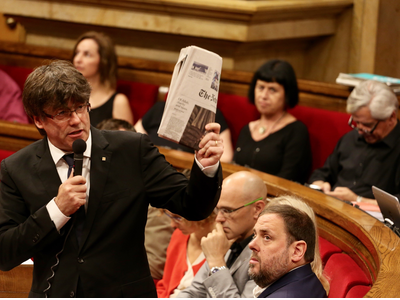- In this week’s parliamentary session, Carles Puigdemont criticised that “while the State seeks the testimony of ballot box manufacturers, it has no interest in recovering the more than €60 bn of taxpayers’ money used to rescue the banking industry”
- The Catalan president also challenged the groups opposing the referendum to “commit to the vote and respect the results”

During Wednesday’s parliamentary control session, the President of the Government of Catalonia, Carles Puigdemont, criticised the State’s public prosecutor’s office “for meddling in areas in which we have the right to act” and denounced that it is “taking orders from political groups, which have resorted to using scare tactics rather than considering participating in legal processes”. Regardless of such tactics, he assured that “on October 1st, we will provide ballot boxes and ballot papers”.
In the same vein, in response to the Cuitadans parliamentary group, Puigdemont went on to state that “the most important thing will not be the ballot boxes, but what they contain” and said “the ballots will not be cast by the executive committees of political parties, or friendly media, or IBEX 35 companies, or banks, but by each and every citizen in Catalonia, who anonymously, but courageously, has every right to vote and decide their future”.
Puigdemont stressed, in this sense, that “while the Spanish State is very interested in seeking testimony from companies that manufacture ballot boxes or produce IT systems, it has no interest in recovering the more than €60 bn of taxpayers’ money used to rescue the banking sector”. The President qualified it as a ‘con’ and a ‘disgrace’ that “public money was used to bail out the banking system, when the minister guaranteed in Congress that this would not cost the public any money at all”. He compared the State's attitude to that of other European governments with respect to bank bailouts, which have been paid back with interest, and expressed “not only incredulity, but also deep indignation”.
In relation to the ballot box manufacturing tender, President Puigdemont defended the Executive Council’s action by stating that “we demand guarantees and if the bids do not provide them, we will have no problem starting the procedure using all the methods at the administration’s disposal to meet the goal of providing, among many other things, ballot boxes for the referendum on 1 October”.
Additionally, several times during the session the President challenged parliamentary groups that oppose the referendum to “commit to voting if there are ballot boxes and accept the result”. “I guarantee that there will be ballot boxes” he assured and added that “our concern is not that there will be ballot boxes, but that there will be ballot papers in them reflecting the inviolable decision of the Catalan people”.
Later in the session, in response to the president of the PP (Popular Party) parliamentary group, the President stated that “if anyone is presenting a bad public image to the world it is the Spanish State, which has been the subject of an editorial in one of the world’s most important newspapers, The New York Times”, which spoke out against the intransigence of the Spanish government and encouraged agreement on the referendum. “A newspaper that is not radical, that is not, as you maintain, fanatical, and in which we have not invested any money, tells you that are making fools of yourselves, that nobody is buying the idea of a coup d'état with ballot boxes”, because, he insisted, “in a civilised and orderly world, people usually resolve their differences, at least in democracies, with ballots”.
Additionally, in response to questions from the pro-independence Junts pel Sí parliamentary group, President Puigdemont rejected the idea that the Catalan political process is ‘scaring off’ investors, because in this process Catalonia “has smashed records” in terms of exports and foreign investment. “Today we have a more internationalized economy than we had in the Statute of Autonomy period; pre-independence Catalonia is attracting more foreign investment than autonomous Catalonia” he stated. In the same vein he also said that “an all-time foreign investment record” has been broken and that unemployment “is dropping more quickly” than in Spain and more employment is also being created in Catalonia. “These positive results do not fit their agenda and they are making political noise because they don’t like it, but the reality is that we are the Spanish State’s economic and industrial engine” he stated.